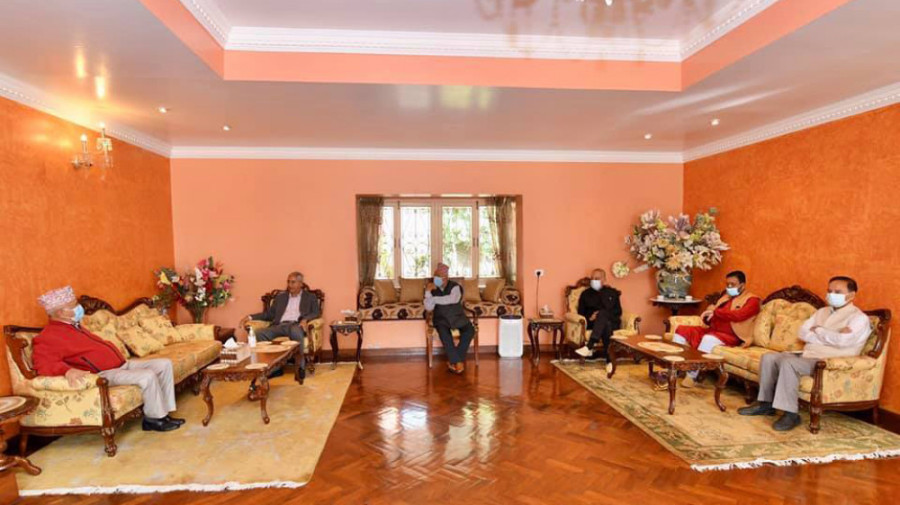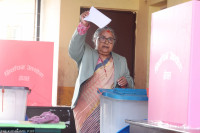Politics
Oli reaches out to Deuba as opposition forces band together
Meeting follows talks between Congress, Maoist Centre and a section of Janata Samajbadi Party leaders.
Anil Giri
CPN-UML chair and Prime Minister KP Sharma Oli on Wednesday made a sudden dash for Budhanilkantha to meet Nepali Congress leader Sher Bahadur Deuba. He was accompanied by four of his trusted aides—Subas Nembang, Ishwar Pokhrel, Bishnu Poudel and Ram Bahadur Thapa.
Nembang is the deputy leader of the UML Parliamentary Party and Pokhrel, Poudel and Thapa are Oli’s Cabinet ministers.
According to Congress leaders, Oli had two agendas—Congress party’s support to his confidence vote motion and a power-sharing deal.
Oli has sought a trust vote in Parliament on May 10.
Congress leaders said Deuba rejected both the proposals.
Earlier on Wednesday, the Communist Party of Nepal (Maoist Centre) withdrew the support it had lent Oli back in February 2018. The move followed Oli’s decision on Sunday to go for a floor test. Meanwhile, the Madhav Nepal-Jhala Nath Khanal faction of the UML has been holding consultations with its leaders on whether to resign as lawmakers en masse before May 10.
The Nepali Congress has already decided to vote against Oli.
Prakash Sharan Mahat, a Congress leader, told the Post that the party president made it clear before Oli that a power-sharing deal could be considered only after May 10 depending on how the situation unfolds.
“We have our priority set,” Mahat, who is also a joint general secretary of the Congress party, told the Post. “We will fail Oli in his trust vote.”
Oli’s position appears to have become untenable, as he has now been cornered by two opposition forces and a section of leaders from within his UML.
The Janata Samajbadi Party, however, is still divided. The section that wants to support Oli controls around 14 of the 34 lawmakers (two suspended).
A Nepali Congress leader said Oli is in a bid to drive a wedge between the opposition forces.
“Oli now feels threatened,” said the Congress leader who did not wish to be named.
Oli’s meeting with Deuba comes a day after a meeting between Deuba, Maoist Centre chair Pushpa Kamla Dahal and Janata Samajbadi chair Upendra Yadav.
At least two sources familiar with the meeting told the Post that the leaders discussed ways to form a strong alliance against Oli.
Oil’s UML party has 121 seats in the House, with around 30 members said to be commanded by the Nepal-Khanal faction.
The 275-member House of Representatives currently has 271 members, as four Maoist Centre members have lost their positions. The Maoist Centre, hence, has just 49 seats.
The Nepali Congress has 63 members (two remain suspended) and the Janata Samajbadi Party has 34 members (two suspended). The Upendra Yadav faction is said to have control over 16 members.
For someone to prove a majority, 136 votes are required. Though suspended members are included to define the strength of the House, they cannot vote as per parliamentary regulations.
There is no clarity how many lawmakers are with the Nepal-Khanal faction, but sources say the number could be around 21.
If all 21 lawmakers from the Nepal-Khanal faction resign as speculated, the House strength will be reduced to 250. With just 100 members with him, Oli will need the support of 26 members to win the trust vote. The support of the Mahantha Thakur-Rajendra Mahato faction of the Janata Samajbadi Party will not be enough as it controls just around 14 seats.
The Congress, Maoist Centre and the Upendra faction of the Janata Samajbadi together can manage 128 votes. This number will be sufficient to form a new government only if at least 21 lawmakers from the Nepal-Khanal faction resign.
The Maoist Centre has long been offering Deuba the prime minister’s post and urged the Nepali Congress to make an alliance to unseat Oli. Deuba, however, has been reluctant.
Deuba maintained that there was no point in taking the lead until the Maoist Centre withdrew its support to Oli and the Janata Samajbadi Party committed to providing full support.
A Maoist Centre leader said Deuba now appears to be interested in leading the government after recent developments in Karnali and Lumbini provinces. In Karnali, the Nepal faction defied the party whip to cross the floor. In Lumbini, Nepal faction leaders were planning to vote against the chief minister.
Janata Samajbadi chair Yadav, however, does not think so.
“I don't think Deuba is fully convinced yet about unseating Oli,” Yadav told the Post. “I don’t know what his problem is.”
The Oli faction’s leaders, however, are tight-lipped.
A leader from the Nepal-Khanal faction said Oli has an easy way out.
“He does not need to run from pillar to post to seek support,” Som Prasad Pandey, a UML leader from the Nepal-Khanal faction, told the Post, insinuating Oli’s meeting with Deuba on Wednesday. “He should reach out to us. If he wants to save his party and position, he should hold talks with us.”
Ever since the UML and the Maoist Centre were revived by the Supreme Court on March 7, the Nepal-Khanal faction has been trying to build parallel structures within the party in a bid to corner Oli.
Oli, on the other hand, has emerged as an all-powerful leader, taking full control of the party.
Lately, he has been on a clarification seeking spree. As many as 27 lawmakers of the Nepal-Khanal faction have been asked to furnish clarification for “working against the party unity.”
“If Oli refused to mend fences, we will have to take a decisive step,” said Pandey. “Whether lawmakers from our faction are going to resign before May 10 is still up in the air. There is no need to run after speculations.”




 27.41°C Kathmandu
27.41°C Kathmandu













